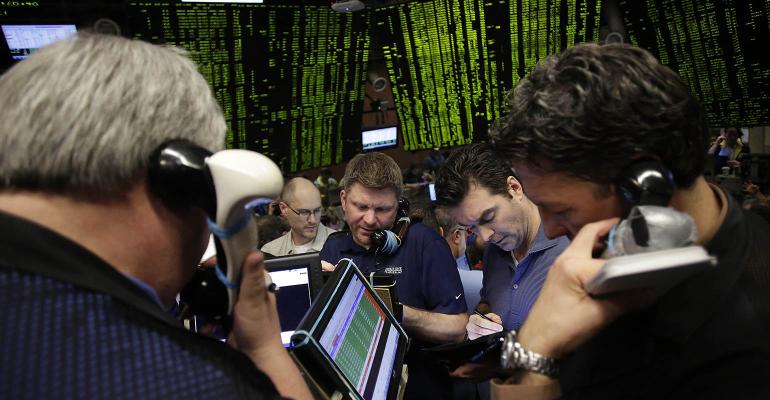By Jared Dillian
(Bloomberg View) --It’s been nine years since the financial crisis, and people are still not ready to forgive Wall Street. Regulations put in place to avoid a repeat are probably staying put for at least a generation, even though they are a bit of an overreach. That’s exclusive of new arrangements such as the clumsily named Markets in Financial Instruments Directive, or MiFID II, which, in the course of fixing things that were not broken, is turning Wall Street upside down. Throw in a healthy dose of automation and algorithmic trading, and many finance professionals are just barely hanging on.
But the interesting thing is that people are hanging on! They are willing to do the same work for less money. For sure, bankers are still well-paid even though compensation levels are down, but the real reason they are staying in the business is that they like what they do. Wall Street shed thousands of jobs in the wake of the crisis, but that’s starting to turn. There were 178,000 securities-related jobs in New York City as of September, the most since the financial crisis, according to New York State Comptroller Thomas DiNapoli.
This is a new development. In the past, you had people seeking to work on Wall Street for the wrong reasons: the money. In the 2001 associate training class at Lehman Brothers, where I worked, there were 300 MBAs. Most had heard of people whose earnings were way out of proportion to their intelligence or work ethic, and had showed up to the Wall Street recruiting events, drinking Miller Lite and eating chicken on a stick. Few had any passion for financial markets. Many did very well for a few years, until they were bounced from the industry.
The interesting thing about the current cycle, which feels a bit like a top, is that people are still being compensated as if they were at the bottom of the last one. The other interesting thing is that people are more or less convinced that the good old days are gone forever. That’s not to say that money isn’t being made, but it’s harder than ever. Compliance is a little insane. The red tape, including the pointless Volcker Rule, which has disrupted day-to-day market-making activities, leading to a drop in liquidity, adds to the frustration.
You still hear about the occasional Wall Street fraud or trading fiasco, but we tend to find these things because we are now looking for them. Surveillance and enforcement are more vigorous than ever. Any market participant will tell you that the level of bad behavior is down by a factor of 10 or more.
Wall Street is about as close as it has ever been to being full of working stiffs. Clock-punchers. These days, throw a paper airplane across a trading floor at 5 p.m. and it won’t hit a soul. Everyone goes home instead of working late on deals. At the beginning of any conversation between two finance workers, one will ask “How’s business?” And the other will answer, “It sucks,” and then there is some gallows humor and the conversation can proceed. Most traders of my generation came into the business dreaming of making millions. They are now satisfied with being able to pay college tuition and property taxes, with maybe a little left over.
Dislike of Wall Street these days tends to center on the idea that there are these corrupt, bloated money managers who willfully overcharge their shareholders with high operating expenses. Some funds are overpriced, but the free market has a way of sorting this out. Also, some of these money managers are just bad at their jobs, but the free market has a way of sorting that out, too. It is not a moral issue. There are low-cost funds and high-cost funds, and recent history seems to suggest that the low-cost funds perform better, but either 1) we don’t have enough a large enough time series to sufficiently prove that beyond a doubt, or 2) people care about things other than performance. Suggesting that the money management industry is ripping people off is usually a symptom of some underlying political bias.
However repulsive you may find the luxury watches, the half-zip sweaters and the seafood towers, good work is being done on Wall Street. And it is downright unglamorous. It will take a while before someone makes a movie with a financier as the protagonist (“Pretty Woman” or “9 ½ Weeks”) instead of target practice (“Assault on Wall Street”), but enough with the hate and discontent. People get up early to make the doughnuts. There will be another crisis, for sure, but you can probably blame the quants.
This column does not necessarily reflect the opinion of the editorial board or Bloomberg LP and its owners.
Jared Dillian is the editor and publisher of The Daily Dirtnap, investment strategist at Mauldin Economics, and the author of "Street Freak" and "All the Evil of This World."
To contact the author of this story: Jared Dillian at [email protected] To contact the editor responsible for this story: Robert Burgess at [email protected]
For more columns from Bloomberg View, visit Bloomberg View.





